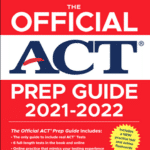
Why would you care what the average ACT score by state is? A lot of colleges and universities have admissions officers who focus on a particular region. Believe me, they’re more than familiar with what the average score looks like in your area! Also, if you’re applying to college in a particular state with a lot of in-state applicants, it’s good to know approximately where you stand in terms of the admissions pool by comparing yourself to local test takers.
So if your score is slightly lower than average for the college—but far above average in your state—it might not hurt your chances as much as you think it might. In fact, it may even help you!
State ACT Score Averages
Here are the average ACT scores by state, plus information about the percentage of students who meet national performance benchmarks for the United States. These are composite ACT scores or scores for the overall ACT test.
| State | % Students Tested |
Average Composite Score |
Average English Score |
Average Math Score |
Average Reading Score |
Average Science Score |
|---|---|---|---|---|---|---|
| Alabama | 100 | 18 | 17.3 | 17.4 | 18.5 | 18.2 |
| Alaska | 14 | 20.4 | 19.3 | 20 | 21.4 | 20.4 |
| Arizona | 64 | 18.4 | 17.3 | 18.5 | 18.8 | 18.5 |
| Arkansas | 93 | 18.8 | 18.3 | 18.1 | 19.2 | 19.1 |
| California | 4 | 26.5 | 26.9 | 25/6 | 27.3 | 25.8 |
| Colorado | 15 | 23.2 | 23 | 22.4 | 24 | 23 |
| Connecticut | 9 | 26.3 | 26.8 | 25.3 | 27.1 | 25.7 |
| Delaware | 5 | 24.9 | 25.3 | 23.6 | 26.1 | 24,3 |
| District of Columbia | 18 | 26.9 | 27.4 | 25.2 | 28.2 | 26 |
| Florida | 46 | 19 | 18.5 | 18.4 | 20 | 18.8 |
| Georgia | 30 | 21.6 | 21 | 20.8 | 22.5 | 21.5 |
| Hawaii | 53 | 18.8 | 17.6 | 18.6 | 19.4 | 19.1 |
| Idaho | 15 | 22.8 | 22.3 | 22.2 | 23.7 | 22.6 |
| Illinois | 18 | 24.5 | 24.8 | 23.7 | 25.2 | 24 |
| Indiana | 13 | 22.8 | 22.1 | 22.5 | 23.7 | 22.5 |
| Iowa | 49 | 21.4 | 20.4 | 20.6 | 22.3 | 21.6 |
| Kansas | 73 | 19.9 | 18.9 | 19.4 | 20.6 | 20.1 |
| Kentucky | 96 | 18.6 | 17.8 | 18 | 19.2 | 18.7 |
| Louisiana | 100 | 18.1 | 17.6 | 17.4 | 18.6 | 18.3 |
| Maine | 2 | 25.1 | 25.2 | 23.7 | 26.2 | 24.6 |
| Maryland | 8 | 24.4 | 24.6 | 23 | 25.4 | 23.9 |
| Massachusetts | 9 | 26.5 | 26.6 | 25.6 | 27.3 | 25.8 |
| Michigan | 8 | 24.6 | 24.7 | 23.9 | 25.2 | 24.2 |
| Minnesota | 69 | 21 | 19.7 | 20.7 | 21.7 | 21.4 |
| Mississippi | 100 | 17.8 | 17.2 | 17.4 | 18.2 | 18 |
| Missouri | 66 | 20.2 | 19.5 | 19.5 | 21 | 20.4 |
| Montana | 94 | 19.3 | 18 | 19 | 20.1 | 19.5 |
| National | 36 | 19.8 | 19 | 19.3 | 10.4 | 19.9 |
| Nebraska | 94 | 19.4 | 18.6 | 19.1 | 19.8 | 19.6 |
| Nevada | 100 | 17.3 | 16.1 | 17.1 | 17.8 | 17.6 |
| New Hampshire | 5 | 25.7 | 25.7 | 25 | 26.5 | 25.2 |
| New Jersey | 12 | 24.6 | 24.9 | 23.9 | 25.1 | 24 |
| New Mexico | 20 | 19.8 | 18.7 | 19.1 | 20.9 | 20.1 |
| New York | 10 | 25.3 | 25.2 | 24.6 | 26 | 25 |
| North Carolina | 88 | 18.5 | 17.1 | 18.5 | 19.2 | 18.8 |
| North Dakota | 96 | 19.2 | 17.9 | 19.1 | 19.7 | 19.6 |
| Ohio | 82 | 19.4 | 18.2 | 19.2 | 20 | 19.7 |
| Oklahoma | 94 | 17.9 | 17 | 17.3 | 18.6 | 18.2 |
| Oregon | 7 | 23 | 22.5 | 22 | 24.2 | 22.8 |
| Pennsylvania | 7 | 24.4 | 24.3 | 23.7 | 25.2 | 24 |
| Rhode Island | 5 | 25.2 | 25.3 | 24 | 26.2 | 24.7 |
| South Carolina | 40 | 18.9 | 17.8 | 18.5 | 19.6 | 19.1 |
| South Dakota | 58 | 21.5 | 20.5 | 21.2 | 22.2 | 21.7 |
| Tennessee | 100 | 18.6 | 18 | 18.1 | 19 | 18.5 |
| Texas | 22 | 19.8 | 18.7 | 19.5 | 20.4 | 19.9 |
| Utah | 91 | 19.9 | 18.9 | 19.4 | 20.6 | 20.2 |
| Vermont | 8 | 23.7 | 23.4 | 22.4 | 25 | 23.5 |
| Virginia | 9 | 24.6 | 24.6 | 23.5 | 25.7 | 24.3 |
| Washington | 7 | 24.6 | 24.3 | 23.6 | 25.6 | 24.3 |
| West Virginia | 28 | 20.5 | 20.2 | 19.4 | 21.4 | 20.4 |
| Wisconsin | 93 | 19.4 | 18.3 | 19.3 | 19.7 | 19.8 |
| Wyoming | 100 | 19.2 | 18.1 | 18.9 | 20 | 19.5 |
| National | 36 | 19.8 | 19 | 19.3 | 20.4 | 19.9 |
This chart contains data on the percent of high school graduates who took the ACT, average composite scores, and the average scores by subject. The data is organized by U.S. state.
Data from ACT Average Scores by State (PDF), provided by the ACT.
That’s a lot of information, so let’s break it down. The table gives us the average composite score for each state, as well as the percentage of students from each state meeting college-readiness benchmarks in English, Reading, Science, and Math.
What’s a Readiness Benchmark?
If you take a look at the Condition of College & Career Readiness 2019 report (PDF), the most recent report released by ACT, you can see that they take another measure into consideration for college readiness.
ACT has done a lot of research (and I invite you to read it), but for those of you on a tight schedule, this is how the ACT evaluates college readiness:
- ACT scores (or other standardized test scores) are a valuable predictor of college success for high school students, taken in consideration with high school grades and other factors.
- The “benchmark” scores for each section show the threshold above which high school graduates can expect to be reasonably prepared for college courses in this subject area. More specifically, the ACT explains, these indicators show the percentage of students who “have a 50% chance of obtaining a B or higher or about a 75% chance of obtaining a C or higher in corresponding credit-bearing first-year college courses.”
- In each state, a different percentage of test-takers meets or exceeds the benchmarks every year.
Note: This year’s data does not contain the percentage of students meeting the college readiness benchmark. For reference, see the 2021 data.
Average ACT Scores by the Numbers
What do those scores mean in a national context? In 2019, the national average ACT score was 20.8 (Source: ACT College Readiness 2019 Report). The breakdown looks like this:
| ACT Test (Section) | Average Score (2019) |
|---|---|
| English | 20.2 |
| Math | 20.5 |
| Reading | 21.3 |
| Science | 20.7 |
| Composite | 20.7 |
However, keep in mind that these numbers come from an incredibly large pool of students (over 2 million, according to the National Center for Education Statistics!) each of whom is taking the ACT for different reasons.
So the overall averages are really not all that helpful in contextualizing your score. Instead, let’s look at how to contextualize average SAT scores by state and how you can use them to your advantage.
What Average ACT Scores by State Mean for Everyone
Benchmarks are one way of determining college readiness and what constitutes a “good” ACT score, and they’re more reliable than comparing your score to the 20.8 average. But as we’ve seen, test scores in one state are not perfectly comparable to scores from another state—the 100% test rate in some states shows us that, in places, all students, not just those who are determined to go to college, take this exam. This most likely lowers that state’s ACT composite score.
A Better Way to Put Your Score in Context
In other words, to get a better idea of how your scores stack up, it can be helpful to look at data from a smaller pool of students—preferably some who have had a similar education.
- First of all, you can look at average ACT scores for your state.Although you will find that scores don’t vary drastically between states, you may live in a slightly less or more competitive one.
- Next, you can look at average ACT scores for your high school.Many students can access this data on their high school’s “Profile” sheet. This might be posted on your school’s website, or you can ask your college counseling department for it. In fact, this is a really crucial piece of paper. Did you know that this is the info colleges use to understand how your high school compares to other high schools, as well as how you compare with to fellow students? Information is valuable, people!
- Compare them to the average ACT scores at the colleges or universities you are targeting.If you don’t have a college list yet (or even if you do), I highly recommend doing some exploratory research by reading our comprehensive post on ACT scores, which has a great table you can use to find the average test scores at the top 100 U.S. universities.
As you might expect, more selective schools have high average scores (even up to the highest possible score of 36!), while less selective schools have lower average scores. But keep in mind that these are usually ranges–you don’t need to get the maximum score of 36 to get into a highly selective school (though it won’t hurt!).
The Magoosh Answer
Your ACT score can be a very important factor in determining college admissions. So make sure to arm yourself with all of the above facts and figures before you set your ACT goals. But, it’s also important to keep in mind that your ACT scores are only one part of who you are as an applicant, and you have lots of other talents to offer a college or university!
And, don’t forget the most important person to be comparing yourself to is…you.
So, if you studied hard and increased your ACT score from a 16 to a 20, that is a huge win! You are now way better prepared than “average you” was before. And that—rather than the average ACT scores by state—is what really counts at the end of the day.






Leave a Reply